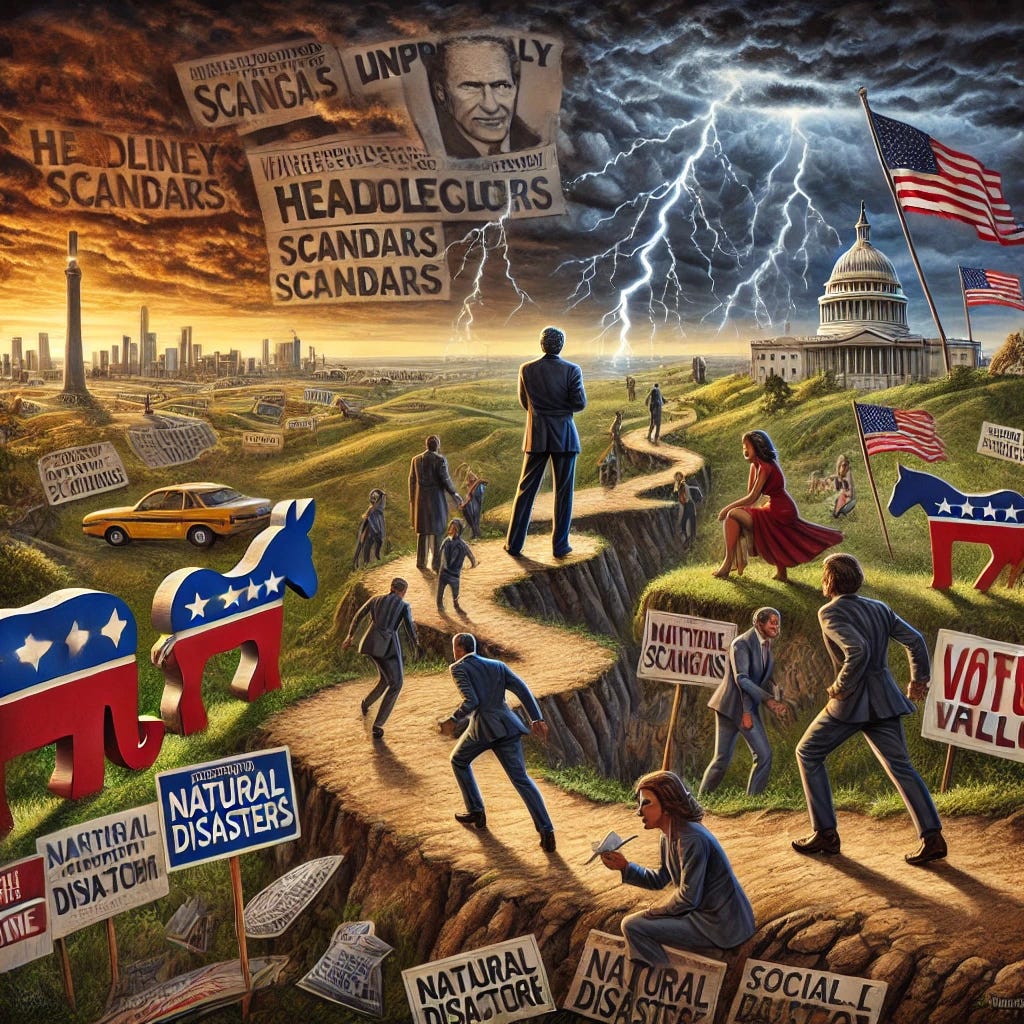There’s a hackneyed saying I’ve heard in just about every place I ever lived or visited, usually parroted unironically with an oddly misplaced sense of pride by a local: "If you don’t like the weather in (insert place here), just wait a few minutes!"
I suppose the same could be said in American politics, where the unexpected ushers in a new dynamic, or even an entirely new candidate; upending a settled narrative faster than a breaking news alert.
American political races have often been unexpectedly upset by the crushing momentum of the unexpected, ranging from natural disasters to scandals and assassinations. Acts of God, such as Hurricane Sandy in 2012, highlighted President Obama's leadership during the crisis and contributed to shoring up his previously shaky chances of re-election over Mitt Romney. Conversely, George W. Bush took a beating over his weak Hurricane Katrina response, a threat to his successful re-election.
October surprises have also played pivotal roles in elections. The 1980 U.S. Presidential Election saw the Iran hostage crisis deeply affect the outcome, with President Jimmy Carter's failure to secure the hostages' release contributing to his defeat by Ronald Reagan, who was involved in some behind-the-scenes maneuvers.
In 2016, FBI Director James Comey's announcement about the reopening of the investigation into Hillary Clinton's emails swayed undecided voters, aiding Donald Trump's narrow victory by drawing an inside straight in the electoral college.
Assassinations have dramatically altered political landscapes. Robert F. Kennedy's assassination in 1968 shifted the Democratic primary and led to Hubert Humphrey's eventual loss to Richard Nixon. In Israel, the assassination of Prime Minister Yitzhak Rabin in 1995 changed the political scene, resulting in Shimon Peres losing to Benjamin Netanyahu, who is currently dealing with the fallout from his response to the October 6 attacks by Hamas.
And don’t get me started about Abraham Lincoln.
Scandals and economic crises have also had profound impacts. The Watergate scandal in 1974 caused significant losses for the Republican Party, while the Teapot Dome scandal in 1924 weakened the GOP, although Calvin Coolidge still managed to win. The Great Depression in 1932 led to Franklin D. Roosevelt's landslide victory over Herbert Hoover, and the 2008 financial crisis favored Barack Obama over John McCain, as voters sought change and economic recovery. These events illustrate how unforeseen circumstances can drastically change the outcomes of political races.
Then there is simply the case of a successful president who has aged out of the job. This phenomenon is glaringly evident in the unfolding saga of Harris vs. Trump, where Vice President Kamala Harris’s unexpected candidacy has not just altered but flipped the script on what was initially perceived as a predictable political race.
When President Biden announced his retirement from the 2024 race, the conventional wisdom suggested a straightforward path for Trump to reclaim the Republican nomination and potentially the presidency. The narrative, heavily reliant on Biden's established incumbency, painted a picture of continuity versus disruption. Biden, the steady hand, was to be contrasted with Trump, the maverick.
But with Biden stepping aside, the storyline took a dramatic turn.
Enter Kamala Harris. As the first woman, the first Black person, and the first South Asian vice president, Harris’s candidacy inherently promises a historic campaign. However, beyond her identity, it is her seemingly newfound political acumen and strategic positioning that have profoundly reshaped the narrative.
Initially, the media and political pundits were skeptical. Could Harris galvanize the Democratic base the way Biden did? Could she stand up to Trump’s combative style? These questions seemed to dominate the airwaves. But Harris began to redefine the terms of the race.
For instance, Harris’s deep connections within the Democratic Party and her ability to energize key demographics, particularly women and minority voters, quickly became apparent. Unlike Biden, who had to spend considerable effort to win over younger and more progressive voters, Harris already had a rapport with these groups, thanks to her life circumstances, previous presidential campaign and work as vice president.
One of the most striking examples of how Harris has disrupted the expected narrative is her approach to policy and debate. Rather than shying away from contentious issues, Harris has leaned into them, presenting stances on abortion and reproductive rights, climate change, healthcare and criminal justice reform.
This assertiveness has not only distinguished her from Biden's more centrist approach but has also put Trump on the defensive, a position he is notoriously uncomfortable with. She’s also not allowing him to define her—it’s an old debater’s trope that if your opponent defines you or your issue first, you will lose, which may explain why she is calling the ex-president weird, out of touch, crooked, and incompetent.
And there are plenty of Bidenistas relishing the opportunity to point out that with President Biden’s withdrawal from the race, Trump, at 78, is now the oldest candidate in history.
Furthermore, Harris’s candidacy has sparked renewed enthusiasm and engagement among Democratic voters. Her ability to blend personal narrative with policy expertise has proven to be a potent combination. A revitalized Democratic base is crucial, as voter turnout will obviously be a determining factor in the 2024 election.
Moreover, Harris’s candidacy has forced the Republican Party to reassess its strategy. Trump, who thrived on defining his opponents with catchy nicknames and divisive rhetoric, now faces a candidate whose historic candidacy and compelling personal story are difficult to caricature.
The usual playbook of sowing doubt and fear has met a formidable challenge in Harris’s narrative of progress and inclusivity. It worked for Obama, right? But the GOP has ideas about how to chip away at her new star status, trying to open up a divide between Harris and her benefactor, President Biden. More attacks will come—and some of these punches will land.
The international stage is another arena where Harris is attempting to flip the script. Her diplomatic engagements and stances as vice president (Ukraine, etc.) are being used to position her as a knowledgeable and capable leader on global issues. This contrasts starkly with Trump’s more isolationist tendencies and previous erratic foreign policy moves.
In essence, Kamala Harris’s candidacy has done more than just fill the void left by Biden’s departure; it has redefined the contours of the race. The settled narrative of a straightforward Trump resurgence has been supplanted by a dynamic and unpredictable contest.
Harris has demonstrated a political candidate coming in at the right time, with the right message and strategy, indeed can dismantle a previously settled narrative.
But can she win? We will soon find out.
As a former political candidate and student of politics, history, and the power of messaging, I am fascinated by this contest and am frankly shocked to see how quickly everything changed in the minds of likely voters, influencers, and yes, the political news media, which some say thrives on drama, contrast, and clicks.
It’s going to be an interesting next few months, to say the least. I’ll be watching the candidates navigate these baroque new contours of the race and listening carefully to the electorate’s response.
Indeed, one thing is for sure: if you think it’s going one way and that it cannot possibly change, you may just need to wait a few minutes.





